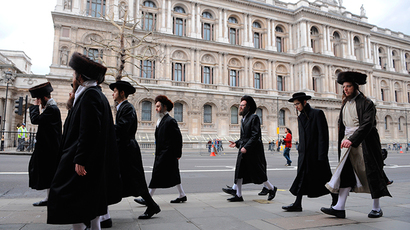63% of Jews question their future in the UK – poll

Rising anti-Semitism and mass protests against the Israeli assault on Gaza have caused almost two-thirds of British Jews to question their future in the UK, according to a Jewish Chronicle poll.
The JC asked 150 people: “Since the protests against the war in Gaza began, have you or your friends had a discussion about whether there is a future for Jews in the UK?” Just over 63 percent answered “Yes.”
The Community Security Trust says July was the second worst month of anti-Semitism since British records began, with 240 incidents logged. A spokesman for CST said that the number of incidents continued to “rise steadily” during the first two weeks of August.
“This is well over double what we would normally expect to see and most of the incidents are linked to what’s going on in Israel and Gaza,” a CST spokesman said. Britain has not seen such a stark escalation in anti-Semitic hate crimes since the Gaza War in 2009, during which almost 1,400 Palestinians lost their lives, he said.
The JC quoted participants from around the country who echoed these concerns. In Manchester, Carole Sewelson told JC: “I used to live in Israel but I do regret coming back to the UK. I can’t understand the hatred in this country, the anti-Semitic remarks, when we are all British.”
Glenn Cohen, a shop worker from Prestwich, said: “I think about leaving all the time. I love this country, but there are hotter countries where you don’t get all of this tension.”
In London, Yael Wilk said: “I think everyone in Europe feels unsafe. My husband is half-Israeli. We are absolutely desperate to make Aliyah [the immigration of Jews from the diaspora to Israel]. More than ever, we want to leave to go to Israel.”
According to the Scottish Council of Jewish Communities, “a number of people have said that they no longer feel welcome in Scotland and that they are actively considering moving to Israel.”
Up to 80 percent of British Jews say non-Jews blame them for the Israeli government’s actions, according to the Institute for Jewish Policy Research study. Almost 70 percent of respondents also said they believe anti-Semitism had become more acute in Britain in the five years leading up to 2012.
It found the experience of anti-Semitism is often bound up with perceptions of the political and military decisions of the Israeli government. Bomb threats, vandalized synagogues, racist banners and assaults are just some of the anti-Semitic hate crimes plaguing the UK since the Israel-Gaza crisis began. A large proportion of this discriminatory abuse is being carried out by young Muslim males, according to the Sunday Times.
During an interview on BBC Radio 4's Today programme, Chief Rabbi EphraimMirvis said that while criticising Israeli policy did not constitute anti-Semitism, it did “create a context within which anti-Semitism can thrive”.
He said that evidence suggested that many Jewish people had begun “consider their future in the UK” in recent weeks because of the upsurge in incidents.
Gaza solidarity protests in London have included a visible Jewish presence, calling for a marked distinction to be made between the actions of the Israeli state and the Jewish people as a whole.
Young Jewish Left handed out a leaflet titled, “How to criticize Israel without being anti-Semitic: A primer,” noting anti-Jewish tropes while making clear that Jews “should not be expected to ‘prove’ themselves to be morally acceptable” by rejecting a connection with Israel.














